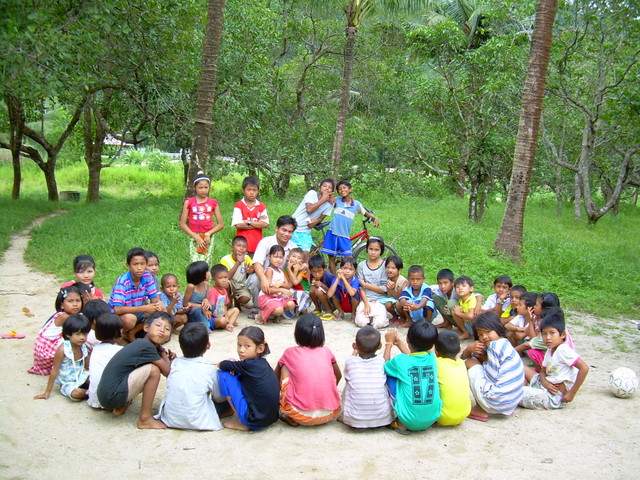Bend In The Road
By Gil L. Casio SM
The author, a seminarian with the Society of Mary, is stationed in Thailand, having been in Myanmar for a while. He is from Surigao.
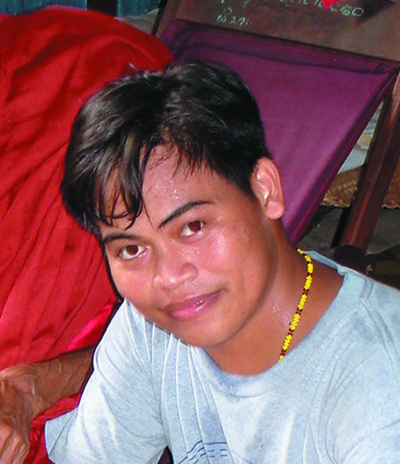 Last year, I had the privilege of joining the team of the Marist Mission Center – Australia (MMC) in visiting refugee camps in Maesot in northern Thailand. Thousands of the Karen tribe from Myanmar (formerly Burma) live there in the middle of the jungle. It was my first time to see people who were obviously suffering from injustice and oppression.
Last year, I had the privilege of joining the team of the Marist Mission Center – Australia (MMC) in visiting refugee camps in Maesot in northern Thailand. Thousands of the Karen tribe from Myanmar (formerly Burma) live there in the middle of the jungle. It was my first time to see people who were obviously suffering from injustice and oppression.
Young Karens
I stayed with young Karens in a hostel for a few weeks. They were very friendly and affectionate. They shared their experiences and how they came to the camp. Life isn’t easy for them. They are far from home and their loved ones.
Their hearts’ desire
I was moved by their words, ‘I want to change the world.’ In their hearts they are dreaming and hoping to change the world. Being with them was really an eye-opener, seeing the brokenness of the Myanmar people.
My brief experience with the young Karens was the first step, as I prepared myself to go to Myanmar, to answer the call to witness.
Mission Exposure
It is part of my formation as a Marist seminarian to have a two-year ‘Marist Mission Exposure’ overseas. I went and joined the small group of Marist missionaries – two priests and a Lay Marist – in the Kachin State in northern Myanmar, in the town of Bhamo, only a few kilometers from the border with China. Mission in this isolated place full of suspicion is difficult.
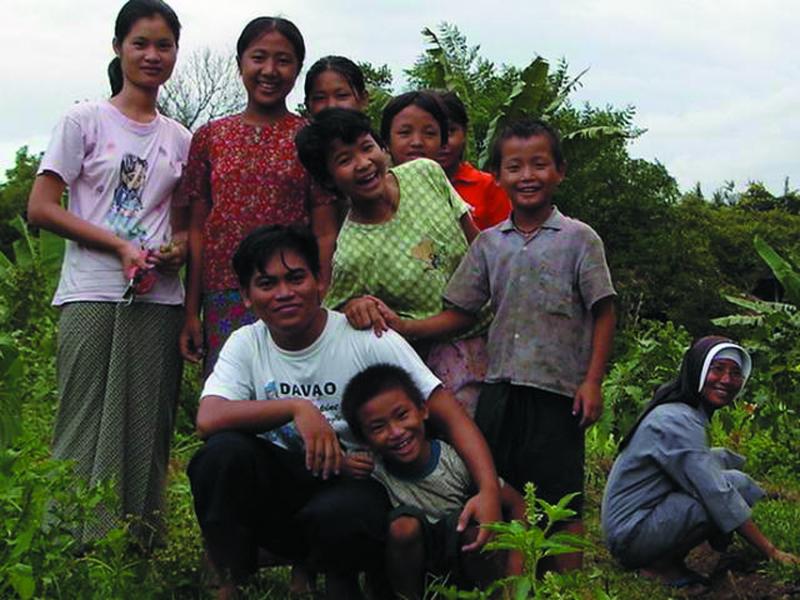
Gil with the Kachins-Burma
I started to learn Kachin, known as ‘Jinghpaw.’ It is easier to learn than Burmese, the national language. I felt so at-home with the very warm and hospitable Kachins as I began to adjust to their culture and language.
I said to myself, ‘I wish to make my home with them.’ I wanted to do something for them, especially the youth, to empower and encourage them, for they are the hope of the future for their country.
After two months, Bishop Francis Daw Tang came all the way from distant Myitkyina to inform us that our visas hadn’t been extended. We went to Yangon, the capital of Myanmar, for a few days to see if we could get an extension. Unfortunately, we were being ‘kicked-out’ due to a change in the government’s policy. Non-Government Organizations (NGOs) were also under pressure and some Protestant churches were closed down.
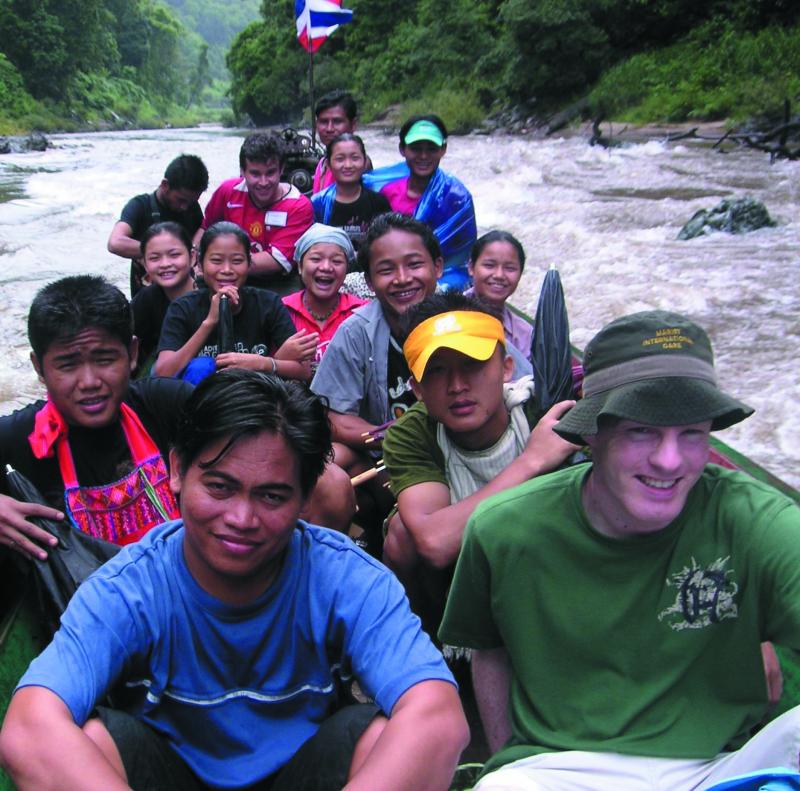
A boat ride to the neighboring camp during the Asia Pacific Development Program 2005 in Thailand
Failed mission?
The Kachin people, whom we loved, wanted us to stay. Their last sad and moving words were, ‘Bai wa rit yaw,’ ‘Please come back.’ I asked myself, ‘Was our mission to Burma a failure?’
We prayed and searched together as a community, asking the Holy Spirit where God wanted us to be. Our mission was really for the people of Myanmar. My community could speak Burmese quite well.
We flew back to Thailand, frustrated, hurt and with heavy hearts.
Possibilities
There are many people from Myanmar in Thailand, where we went from north to south searching for possibilities for mission to the Burmese. We saw that the border town of Ranong in southern Thailand had a great need. So, our two priests went to the Philippines for a meeting and a break, while our Lay Marist went back to Myanmar for the closure of our mission there.
Deeper Understanding
I stayed in Thailand and worked for a few weeks with a Maryknoll priest as a volunteer at an AIDS hospice in the Buddhist monastery in Lop Buri. My commitment to the mission deepened there.
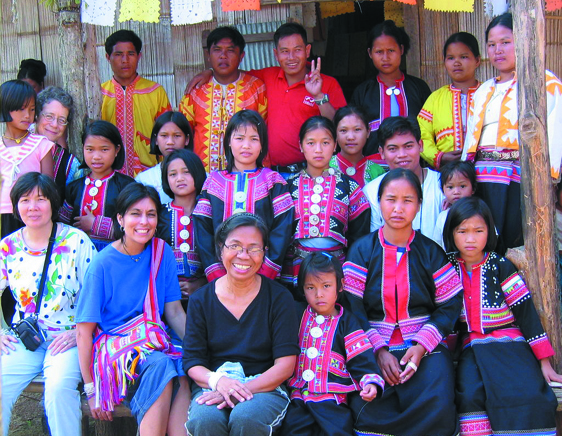
The ‘Lahu’ Hill Tribe-Chiang Mai
Love 101
I served the people in the hospice, feeding them, washing them, cleaning them and changing their diapers, assisting them to stand and walk, listening to their stories that I couldn’t understand, accompanying them as they went to worship their Buddha, washing and dressing their dead bodies in preparation for cremation. I realized how challenging being on mission is. It really demands humility. It really demands true service. It really demands LOVE.
My superior emailed me from the Philippines asking me to look for a house to be our base in Ranong. Though I couldn’t speak Thai, I said ‘Yes!’ Ranong, only 20 to 30 minutes by boat from Myanmar, is home to a large Burmese migrant population, many of whom work in fishing and related industries.
As I walked around the town, I arrived at Saphan Pla, a ‘Little Burma.’ There were Burmese everywhere and Burmese culture was very evident in the noodle and tea shops and betel-nut stands. There was loud Burmese music in the ‘videoke’ bars, men and women everywhere wearing the longyi (sarong), women coloring their faces with thanaka, a mildly fragrant bark ground into a powder, mixed with water and applied to the face in various designs.
I was alone, unable to speak either Thai or Burmese. Very few could understand English. At times I felt rejected by some Thais, as I look Burmese. People from Myanmar are discriminated against in Thailand. Thank God, there were people who generously helped me find a house. When my community arrived in Ranong, it was a great relief for me!
The mission begins
The author with his students
from Bangon school in Thailand
We decided to start our mission for the Burmese people in a quiet, simple and gentle way. We came to know them, their problems and needs. They escaped into Thailand but live as refugees and poor migrant workers. They have few options for rebuilding their lives. They are vulnerable to exploitation such as human trafficking and prostitution, hence prone to HIV-AIDS.
Our mission, my call
We, the Marists in Ranong, reflect on what the Gospel and Church response should be for the migrants from Myanmar.
We work in various ministries among them: the pastoral care, the social care, and the education of Burmese children. I focused on education and volunteered to help in some schools run by NGOs for Burmese children.
I teach English, which is demanding. I remember my first class in a school outside Ranong. Most of the children, even the older ones, couldn’t read or write. Yet, I could teach them, despite my broken Burmese, and play with them. I feel so at-home with these children whom I love. I’m not a licensed teacher but this is my contribution to the mission, to the Church.
We’ve found a greater need here. It is in witnessing that we come to know the violence and poverty experienced by the people of Myanmar. It is in witnessing that we come to know the division and prejudices among their tribes. It is in witnessing that we can offer hospitality, do something, serve them and bring hope and healing.
In the mission I experience struggles and pain. I need to be strong and courageous. Indeed, my experience in mission is an experience of God.
You may email him at
GodisLove@mail2Love.com
or gcasio@gmail.com
